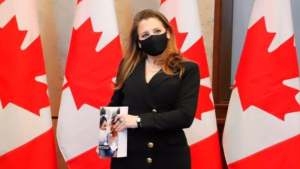Rapidly declining federal aid for the travel industry starting in July will be devastating, according to ACTA.
The association’s remarks come a week after Finance Minister and Deputy Prime Minister Chrystia Freeland tabled the government’s first federal budget in more than two years. ACTA has been studying the 724-page document since its release and has identified areas of benefit — and areas of significant concern — to travel agents.

“Leading up to the budget, ACTA was hearing from multiple sources in Ottawa that there were strong indications that the government would be eliminating several financial support programs including CEWS, CERS and CRB programs,” said ACTA president Wendy Paradis. “This move would follow New Zealand and Australia who ended their Job Keeper or wage subsidy programs effective March 31, 2021 causing a devastating impact on travel agent businesses.”
“So, we were pleased the Canadian government extended these financial aid programs,” Paradis said, “but have grave concerns about the aggressive tapering off for all of these programs in the travel industry.”
In a meeting with Freeland last week, ACTA learned that the budget assumes that vaccine rollout will continue at a rapid pace through the end of June. “I believe Canadians are going to have a great summer,” Freeland said.
“While we hope that the minister is correct, ACTA along with other travel and tourism associations stressed that the timelines are premature,” said Paradis. “Given that we are still under very strict lockdowns, borders closed and travel restrictions in place — travel agencies and travel agents will not see any notable increase in revenue in Q3 and Q4 when aid programs are set to expire.”
ACTA, along with other travel and tourism associations and its members, will continue to aggressively lobby the government to stress the importance of these financial support programs.
The association’s urgent lobby priorities over the next 30 days are to:
- Extend the critical CEWS, CERS and EI programs at maximum support to the end of year — or 90 days after travel restrictions lifted.
- Maintain the CRB benefits at the current $500/week level to the end of 2021 — or 90 days after travel restrictions lifted.
- Extend the RRRF application deadline and other liquidity programs (CEBA, HASCAP, etc.) to the end of 2021 — or 90 days after travel restrictions lifted — and expand the accessibility to sole proprietors for programs where this criterion is not in effect.
- Extend the CRHP to the end of 2021 — or 90 days after travel restrictions lifted.
For more than 13 months, ACTA has intensively lobbied governments drawing much-needed attention to the dire economic situation faced by travel agencies, travel agents, independent travel agents and the entire Canadian travel Industry ecosystem.
A week before Budget 2021 was unveiled, the Ministers of Finance and Transport announced the first financial relief package agreement with Air Canada. It included mandatory customer refunds, and the protection of travel agent commission.
“This is significant,” said Paradis. “In speaking with travel associations around the world, ACTA understands that Canada is the only country where a travel agent commission protection program has been included by the government airline financial relief package.”
There is, however, some good news in the budget, pending further detail.
The Regional Relief and Recovery Fund (RRRF) application deadline was extended to June 30, though travel agents have experienced many challenges with this program, much like some of the other liquidity programs.
The government has proposed creating the Canada Recovery Hiring Program (CRHP), designed to help hardest hit businesses. The CRHP could provide opportunities as the CEWS program decreases, business begins to pick up and there is a need to rehire, although funding amounts decrease monthly and the program is only available June to November.
The government’s allocation of the $1 billion for tourism is currently broken out to $500 million for the Tourism Relief Fund (administered by the Regional Development Agencies) and $500 million to festivals, Canadian Heritage and Destination Canada.
ACTA said the legislative process creates opportunity for input.
“It is important to keep in mind that while the Budget has been tabled, it still has to move through the parliamentary process and as such, by no means is this document the end product,” said ACTA in a news release. “The Budget is currently a framework, although the government will move quickly to introduce the Budget Implementation Act (BIA). The government’s BIA will need to go through the usual legislative process before becoming law — including important committee reviews by both the House and Senate where the legislation will potentially be amended several times before reaching its final form.”
The travel industry can still influence changes to the programs or direct how some of the monies earmarked for the programs can be utilized.
ACTA has already had meetings with some key ministries and will continue this newest lobbying campaign over the coming weeks.
Since the government’s April 12 announcement of the approval of Air Canada’s financial aid package, ACTA has been soliciting feedback from travel agency and travel agent members highlighting the gaps with the protection of commissions.
“While Air Canada and Air Canada Vacations have been making positive adjustments to refund policies, gaps in commission protection remain,” ACTA said.
The association continues to work with travel supplier partners on the refund process and the protection of travel agent commissions. In its original ask of the government, ACTA stressed that if consumer refunds were mandated, airlines and tour operators needed to be given funding to cover travel agent recall commissions.
ACTA has already reached out to the Ministries of Finance and Transport advising that there are some gaps in recall commission protection commissions and that an additional fund may be required.
ACTA is hosting advocacy webinars with special guest MPs. The English webinar with Michelle Rempel Garner, Shadow Cabinet Minister of Health is from 1 p.m. to 2 p.m. on April 27. The French webinar with Stephanie Kusie, Shadow Cabinet Minister of Transport, is from 1 p.m. to 2 p.m. on April 29. Outbound consumer travel trends and insights by the Conference Board of Canada will also be shared.





